Written by Bryan Dearsley
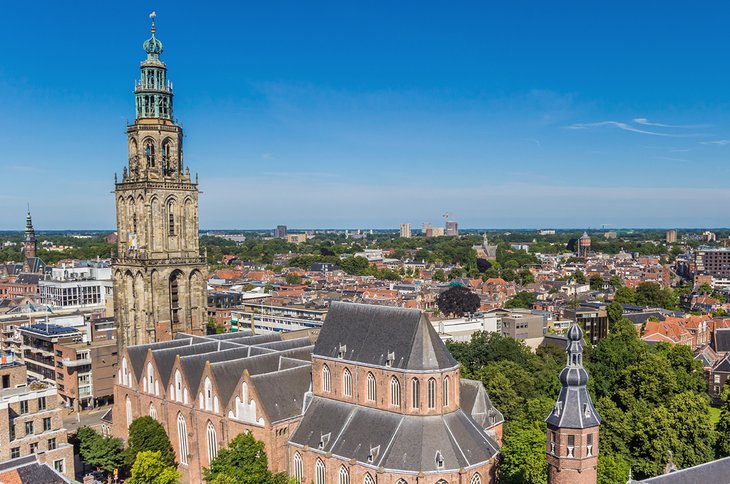
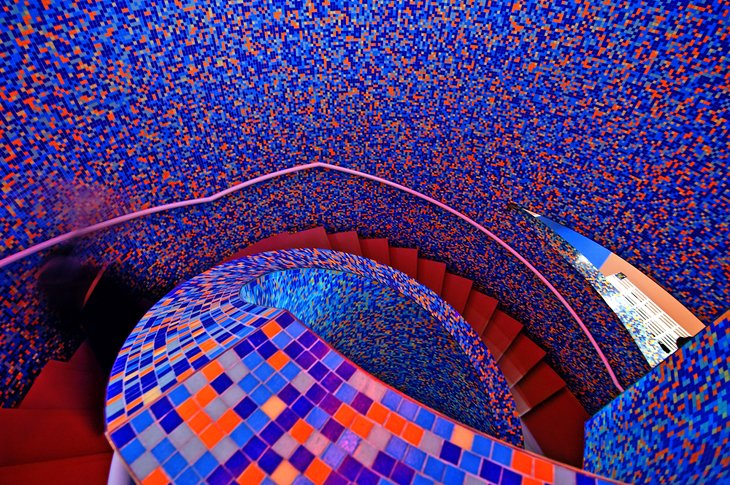
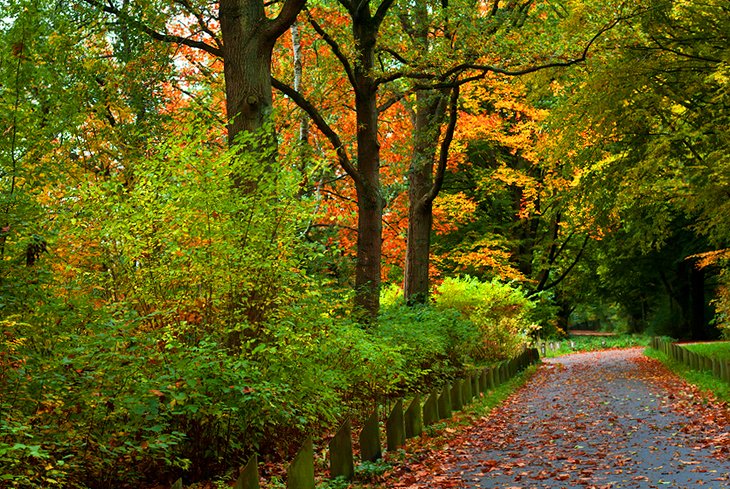
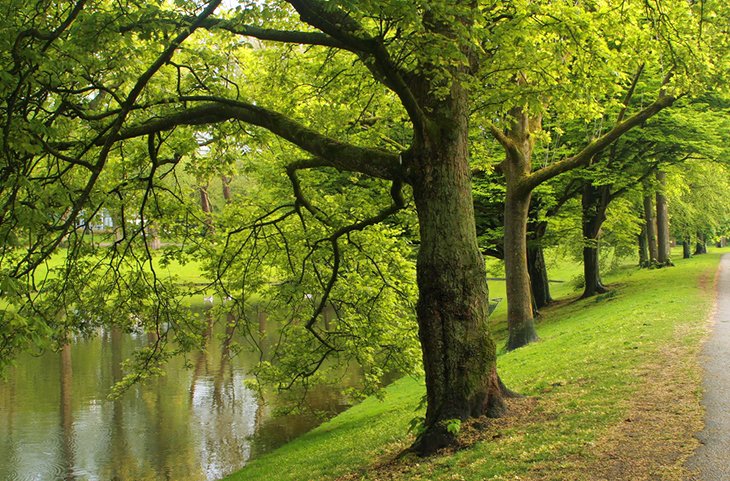
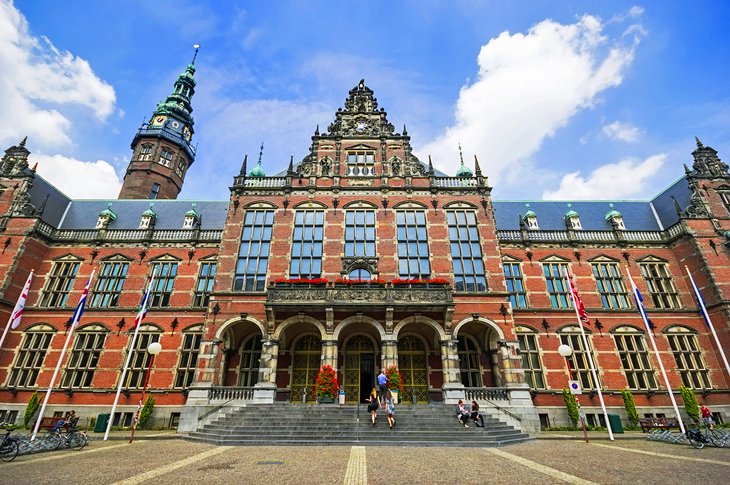
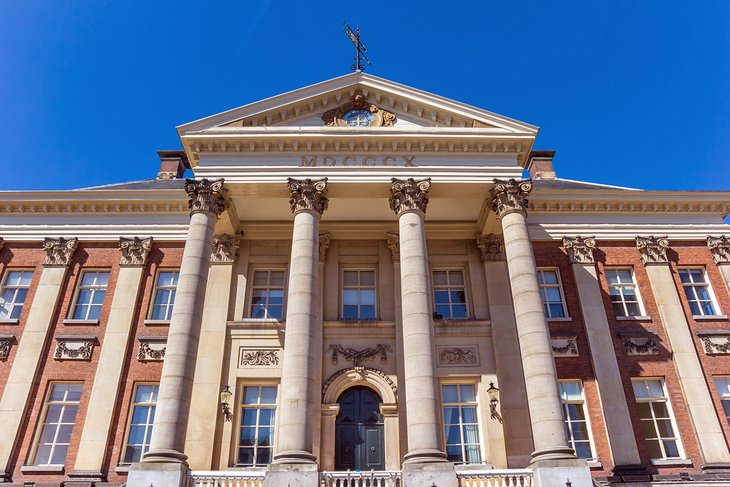
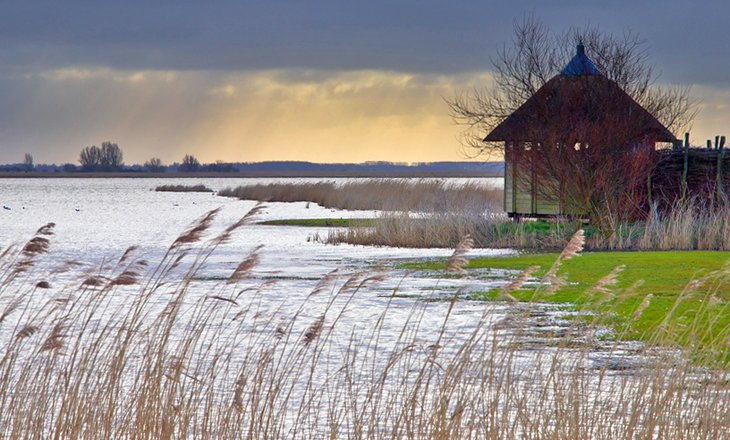
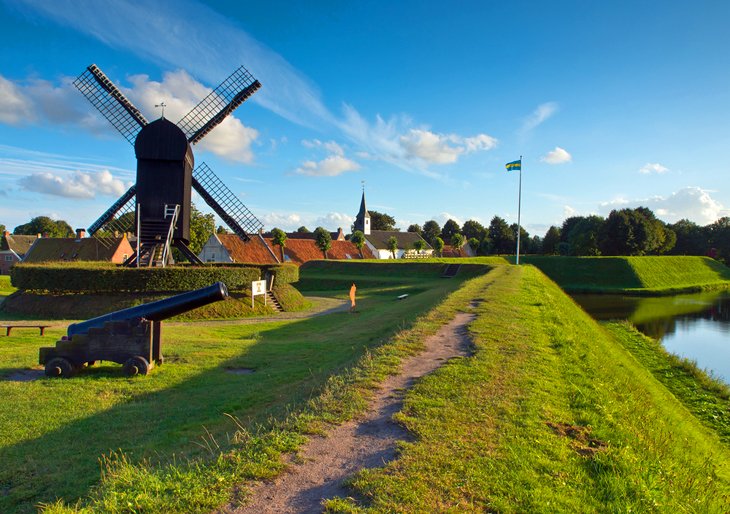
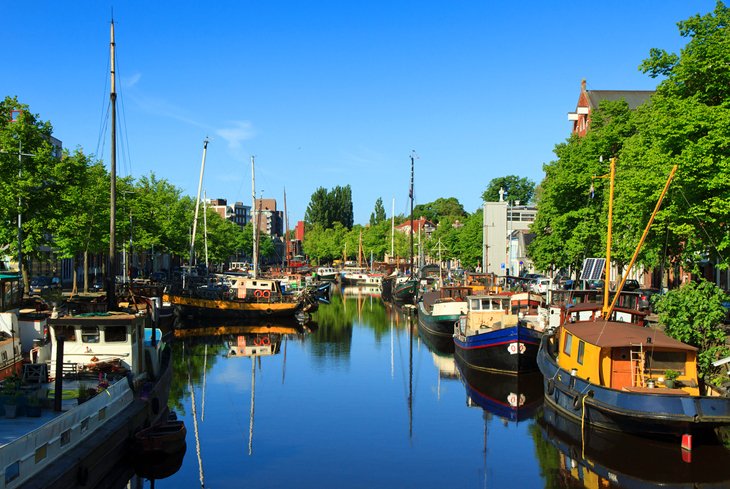
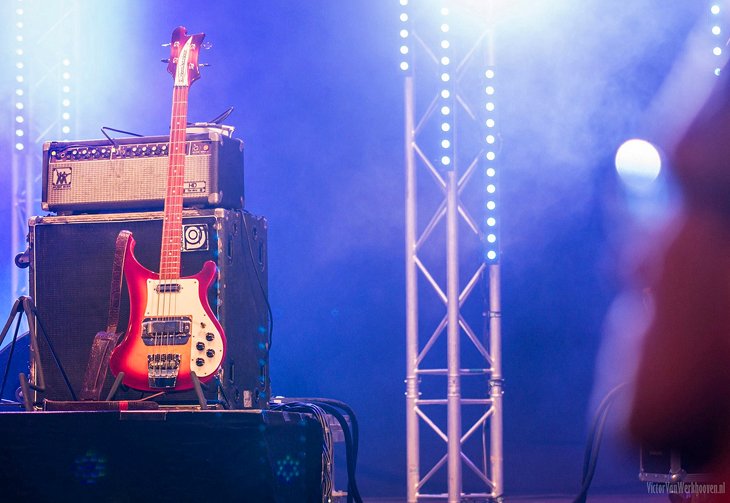
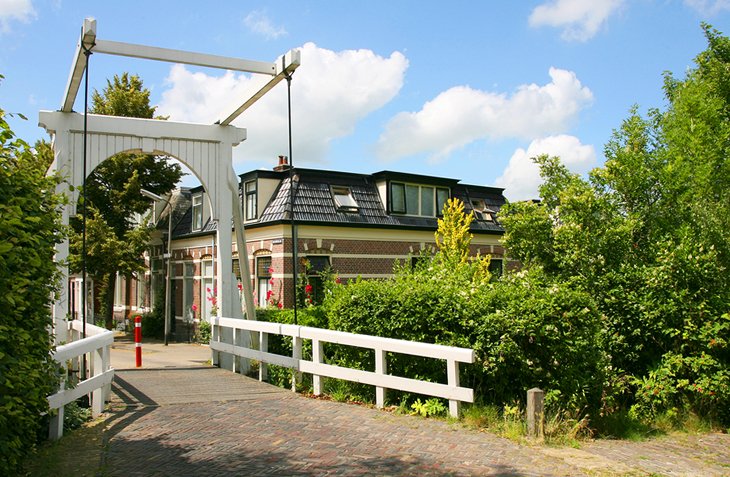
Groningen lies at the junction of the Hoornsediep and Winschoterdiep
canals and has long been an important harbor for coastal shipping to the
North Sea, just 20 kilometers away. The city has a rich history dating
back as far as 1040 when Emperor Henry III granted the Bishop of Utrecht
a fief in the town, together with the right to coin money. It later
became a member of the Hanseatic League and developed into one of the
leading commercial centers in northern Europe. The seat of a university
founded in 1614, the city has long been a hotbed of creative talent,
including being the birthplace of artists Jozef Israëls and WH Message,
and is well known for its lively cultural scene. It's also a great place
to explore by bike, and has long been known as "World Cycling City"
thanks to its extensive network of cycle paths.
1 Martinikerk and the Martini Tower

Martinikerk and the Martini Tower
Share:
Martin's Church (Martinikerk), a lovely brick built Romanesque-Gothic
basilica constructed in the 13th century, is one of Groningen's most
important landmarks. Rebuilt in the 15th century, the old choir was
replaced by one with tall Gothic vaulting and an ambulatory, while a
chapel and sacristy were added to the north side. Interior highlights
include 16th-century wall paintings in the choir, as well as the old
organ built in 1480. Its most notable feature, however, is undoubtedly
the church's tower, the Martinitoren (or Martini Tower to locals).
Originally built in 1482 (and several times rebuilt), the 96-meter-tall
tower is one of the highest in the Netherlands and offers great views over the city's Main Market Square (Grote Markt).
Address: Martinikerkhof 1, 9712 JG Groningen
2 The Groninger Museum

Multicolored stairway
Share:
Founded in 1874, the Groninger Museum remains one of the most
technologically advanced art galleries in the Netherlands. In a splendid
post-modern building on the banks of the Verbindingskanaal, its three
main pavilions host impressive exhibits of modern and contemporary art
from both local and international artists, as well as works from the
museum's standing collections. Highlights of its permanent collections
focus on the history and culture of Groningen and include archaeological
finds, portraits, regional arts and crafts, as well as applied arts.
The collection also includes examples of Chinese and Japanese porcelain
and paintings, works by the Groningen-born painters Jozef Israëls and
Hendrik Willem Message, and the famous Groningen silver.
Address: Museumeiland 1, 9711 ME Groningen
Official site: www.groningermuseum.nl/en
3 Festival Parks: Noorderplantsoen

Groningen's City Park
Share:
Groningen has more than its fair share of open spaces to explore. One
of the prettiest is the Noorderplantsoen, a long narrow park in the
northern outskirts of the city with pleasant meandering pathways. Laid
out on the site of Groningen's former fortifications in the style of an
English garden, the old earth ramparts were incorporated into the
landscape, as were the old moats, which were turned into a series of
ponds. Numerous events are held in the park, including the annual Noorderzon Theater Festival each August. Another very pleasant park to explore is Groningen's City Park (Stadspark) opened in 1926 and home to an arboretum and numerous annual events and concerts.
Address: Binnenstad-Noord, Groningen
4 Noorderzon Performing Arts Festival

Noorderplantsoen
'scar Vilaplana
Share:
The highlight of Groningen's busy theatrical and musical festival
season is the annual Noorderzon Festival. Held each year in the Noorderplantsoen,
the city's main public park, this popular event attracts up to 150,000
visitors annually to experience numerous theatrical, dance, and music
performances, along with literary events, visual arts presentations,
dining, and plenty of other fun attractions. This 11-day festival has
been held every third week of August since 1991, with its main events
taking place in a variety of venues around the city, as well as in the
streets around the park.
Official site: www.noorderzon.nl/en/startpagina
5 Groningen University and Museum

Groningen University and Museum
Share:
Founded in 1614, the Groningen University and its extensive grounds
are worth exploring. A highlight is the main administrative building, an
impressive Neo-Renaissance style structure erected in 1909 with a
number of interesting allegorical figures on its façade. The University
Museum, a first-rate science museum, is also worth visiting. Established
in 1934, the museum features fascinating displays including an Egyptian
mummy, the world's first electromagnetic car, as well as displays
relating to astronomy and ethnology. (Fun English language guided tours
of the museum are available and are conducted by university staff and
students.)
Address: Pelsterstraat 23, 9711 KH Groningen
Official site: www.esn-groningen.nl/university-museum
6 Groningen Old Town

Groningen Old Town
Share:
With its numerous bike- and people-friendly pathways and old squares,
Old Town Groningen is a delightful place to explore. Highlights of a
walking or cycling tour of the city's historic core include the
magnificent early 19th-century Neoclassical Town Hall (Stadhuis) in the Grote Markt, and the superb Renaissance Gold Office (Goudkantoor) built in 1635. Also of interest is the Neo-Renaissance Provinciehuis,
the seat of the provincial government. Notable interior features are
the Hall of the States (Statenzaal) with its fine portraits from the
17th century, and the wood paneling and timber vaulting from 1697. Other
highlights include Huis Cardinaal with its superb Renaissance
façade from 1559 (it's also known as the House of the Three Kings for
its medallions of Alexander the Great, King David, and Charlemagne on
the gable) and Prinsenhof, a former 15th-century monastery with its lovely 17th-century rose and herb gardens.
7 Lauwersmeer National Park

Lauwersmeer National Park
Share:
Just 38 kilometers northwest of Groningen on the North Sea coast is
Lauwersmeer National Park, one of the country's most popular
recreational and conservation areas. Once known as the Lauwers Sea,
after being separated from the Wadden Sea in 1969, its saltwater was
gradually replaced by freshwater, bringing with it a variety of new
flora and fauna. It has since become a popular recreation area boasting
50 kilometers of paths for walkers, as well numerous bike trails,
including one 45-kilometer leg that travels through many beautiful
scenic areas and picturesque villages. Water sports enthusiasts are also
spoiled for choice with such fun activities as sailing, canoeing, and
kite surfing, while bird watching has become increasingly popular with
many dedicated hides and lookouts being added over the years.
Address: De Rug 1, 9976 VT Lauwersoog
Official site: www.np-lauwersmeer.nl/documents/home.xml?lang=en
8 The Fortified Village of Bourtange

The Fortified Village of Bourtange
Share:
Just 61 kilometers due east of Groningen and close to the border with Germany,
the fortified old village of Bourtange is a remarkable feat of
engineering. Built in 1593 and used as a fort until 1851, the entire
village viewed from the air resembles a huge star, its outline marked by
a series of moats and waterways. Now a wonderfully preserved open-air
museum, the village looks just as it would have in the 18th century, and
boasts many excellent things to see, including a collection of cannons
(still fired on special occasions), the fun Museum Railway Line with its
steam locomotive, and special events such as markets and fairs.
Address: W Lodewijkstraat 33, 9545 PA Bourtange
Official site: www.bourtange.nl/index.php/en
9 The Northern Shipping Museum

Groningen boats
Share:
The Northern Shipping Museum (Noordelijk Scheepvaartmuseum), housed
in two interesting old medieval buildings known as Gotisch Huis and
Canterhuis, provides a fascinating glimpse into Groningen's rich
maritime history. The collection was founded in the 1930s and
illustrates the history of inland and coastal shipping and fishing since
Roman times, as well as shipbuilding, with numerous ship models,
paintings, photos, parts of old ships, and navigational instruments.
Address: Brugstraat 24, 9711 HZ Groningen
Official site: www.noordelijkscheepvaartmuseum.nl/en
10 Entertainment and Events

Music Concert, Groningen
Victor van Werkhooven
Share:
In addition to outdoor events such as the Noorderzon Performing Arts
Festival, Groningen is also a popular year-round destination for
visitors due to its vibrant arts and cultural scene. Much of the
activity takes place in and around the City Theater (Stadsschouwburg) in the Turfsingel, as well as concert venues such as Martini Plaza.
Here, you'll see everything from modern theatrical productions to
musical concerts of all genres, including pop and jazz, the latter
particularly popular due to the presence in the town of a music school
whose students regularly hold impromptu jam sessions. A particular
highlight is the Eurosonic Festival, a huge music event attracting more than 100 bands from across the continent.
Day Trips from Groningen
Leeuwarden

Leeuwarden
Share:
About 45 minutes' drive west of Groningen is Leeuwarden, the old
capital of Friesland, famous for its historical architecture and for
being the birthplace of WWI spy and dancer, Mata Hari. It's a pleasant
town to explore on foot, beginning with the old fortified part of town
with its ring of canals. A highlight here is the Wirdumerdijk, a busy shopping street where you'll find old Weigh House
(Waag) built in 1598, a handsome building in Renaissance style in which
butter and cheese were sold until 1884. Other notable old buildings
include the Law Courts (Paleis van Justitie) from 1852 with an imposing doorway flanked by columns, and the 16th-century Het Hof, the former residence of the Stadholder and later of the Queen's Commissioner. The Princessehof Ceramics Museum is also well worth visiting and includes a collection of ceramics and rare Chinese porcelain. 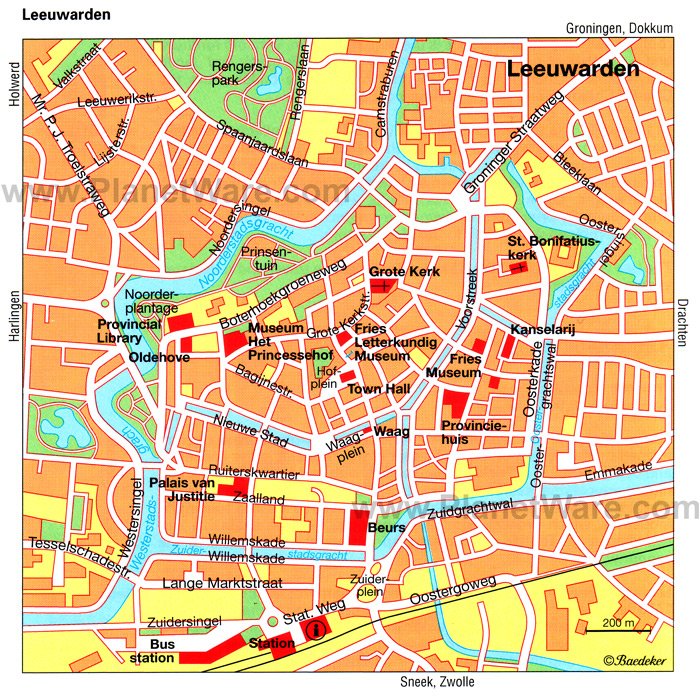 Leeuwarden Map - Attractions
Leeuwarden Map - Attractions 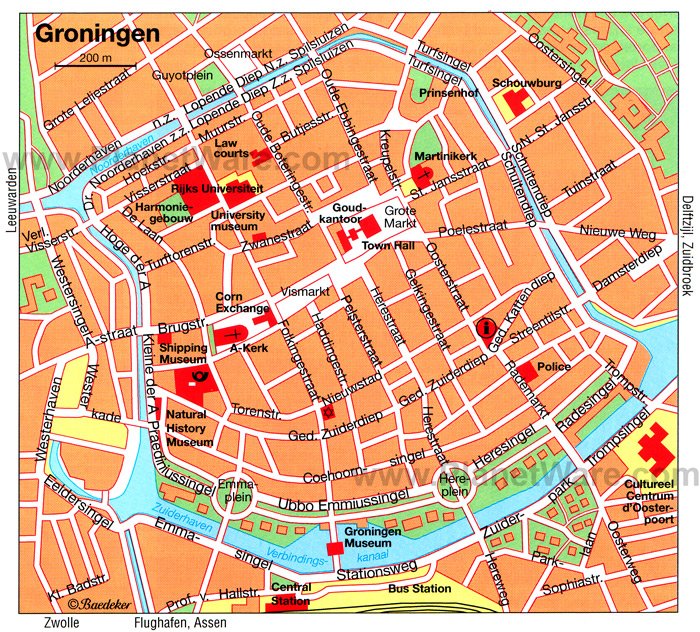 Groningen Map - Attractions
Groningen Map - Attractions
 Leeuwarden Map - Attractions
Leeuwarden Map - Attractions  Groningen Map - Attractions
Groningen Map - Attractions
No comments:
Post a Comment